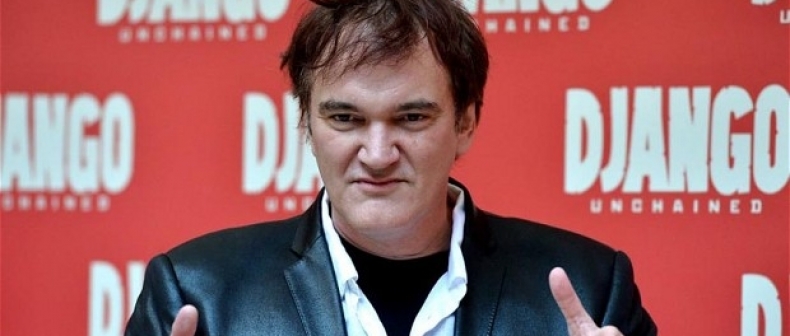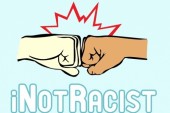
image: Telegraph.co.uk
Quentin Tarantino would have you believe that Django Unchained is a film about empowerment. He would have you believe that it’s about righteous anger and justified vengeance. He wants you to believe that, like Kill Bill and Inglourious Basterds before it, Django Unchained is a fantasy, a cathartic release for black audiences who are tired of seeing their history given the rubber-glove treatment (as one might find in that other 3-hour anti-slavery film of the season, Steven Spielberg’s Lincoln). To make a movie like the one I’ve just described is bold. The 13th Amendment may have been signed into law in 1864, but the negative effects of racism, both social and economic, still continue, and no one has ever accused Tarantino of having a nuanced perspective on race.
Because Django Unchained prominently features a black man killing a whole lot of white folk, and because Quentin Tarantino is a white artist with a baffling affinity for the “n-word,” the weeks following the film’s release have resulted in a stunning amount of media coverage revolving around two dilemmas: a) whether or not it’s appropriate for a white filmmaker to address a topic like slavery within an audience-pleasing genre film, and b) whether it’s appropriate for a white filmmaker to liberally use the “n-word.” And at somepoint after the Drudge Report posted a picture of Tarantino’s face above the headline “N*GGER. N*GGER. N*GGER. N*GGER. N*GGER. N*GGER. N*GGER,” but before the film’s co-star Samuel L. Jackson criticized a white reporter for refusing to say the word, the discourse even reignited a 15-year-old feud between Tarantino and Spike Lee, who claimed in an interview with Vibe that it would be “disrespectful to [his] ancestors to see that film” and later on Twitter that “American Slavery Was Not A Sergio Leone Spaghetti Western.It Was A Holocaust” (sic).
Tarantino is a focal point in these debates because, unlike Steven Spielberg – whose Lincoln is a stately, polite Oscar-friendly film about slavery — Tarantino’s treatment of the subject is brash. At one point in the film, Django (Jamie Foxx), the titular black hero of the film, says “Kill white people and get paid for it? What’s not to like?” It’s a statement that’s meant to be empowering, not just for Django, but for contemporary black audiences. By debating what is “appropriate” for him, critics sidestep the possibly more interesting question of why Tarantino acts with such an assured familiarity towards African American culture. In other words, just how black does Quentin Tarantino think he is? It might be a good idea to step back and look at Django Unchained as a film made, at least in part, for contemporary black audiences, by a filmmaker who identifies, at least in part, with black audiences, and not just as a piece of ironic postmodern wankery.
The (mostly one-sided) feud between Lee and Tarantino began not long after the release of Jackie Brown, when Spike Lee famously criticized Tarantino for his liberal use of the the “n-word,” stating “Quentin is infatuated with the word. What does he want? To be made an honorary black man?” Lee’s accusation may have been more accurate than he actually anticipated. During the press rounds for Jackie Brown, Tarantino regularly claimed that while he wrote the screenplay, which took almost a year, he behaved “in character” as Ordell, the black man (eventually played by Samuel L. Jackson) responsible for most of the film’s 138 utterances of the n-word. This particular comment leads to the troubling mental image of Tarantino – whose actual voice resembles a black comedian’s caricature of a “white person” – wandering around Beverly Hills asking favours from his “niggas” at the carwash.
Tarantino’s familiarity with black culture can be traced to something other than an outsider’s appreciation of blaxploitation cinema. The only other film from 2012 to feature Tarantino’s name in the credits is RZA’s Man With the Iron Fists, a post-modern homage to the kung-fu movies that inspired RZA’s music just as much as they did Kill Bill. RZA plays the blacksmith Thaddeus, a freed slave named after Thaddeus Stevens, the Abolitionist Congressman played by Tommy Lee Jones in Lincoln. Although the media thinkpiece circuit has overlooked Iron Fists, RZA’s film, like Django Unchained, is a neo-grindhouse flick about a former slave overcoming adversity and shares many of the same themes.
Tarantino’s working relationship with RZA goes back at least as far as the Wu-Tang master’s score for Kill Bill, but his friendship goes back farther than that, to a shared appreciation of cheap Hong Kong action films and blaxploitation flicks. Tarantino, a social outcast, identified with black culture for the same reason he was able to maintain a friendship with RZA – a shared appreciation for forms of entertainment considered cheap and disposable by the bourgeois white mainstream. This is the reason that Tarantino was bold enough to give himself a monologue about “dead nigger storage” in Pulp Fiction. This is the reason he once claimed to be one of the two most revered white celebrities in the black community (the other being, for some reason that may have been clear in the 90s, Ricki Lake). He doesn’t act like this because he wants to piss off Spike Lee, but because he thinks, rightly or wrongly, that he’s earned it. This is why he’s willing to make a revenge fantasy about slavery.
Of all the white filmmakers to tackle the history of African Americans, Tarantino might be the most suitable for a film about black vengeance, precisely for the same reasons that he is accused of ignorance — his overfamiliarity with black culture. He might be naïve when he writes about race and he might be insensitive, but there’s no way Steven Spielberg is more enraged by America’s history of slavery than Tarantino.
Does Django Unchained work on this level? Does it work like Sweet Sweetback’s Baadasssss Song? Does it work like Shaft? Is it an angry parable about a black protagonist destroying white power structures through violent means? Can black audience members look up to Django as a mythic folk hero, much like female audiences can look to Uma Thurman’s empowering Beatrix Kiddo in Kill Bill and Jewish audiences can look to Melanie Laurent’s Shosanna as the face of Jewish retribution in Inglorious Basterds?
Unfortunately, it is precisely on this level — in which we have to accept Tarantino’s anger as a conduit for the feelings of black audiences — that Django Unchained fails. Django Unchained is not the film that’s promised by the title. Django isn’t truly unchained until the final moments of the film. Instead of defining the hero as an intelligent, powerful face of black anger, Tarantino defines him through the actions of his white saviour, Dr. King Schultz, a white German bounty hunter played by Christoph Waltz. Django is freed from slavery by a white man, given a job by a white man, and that same white man is responsible for the final turning point that moves Django towards vengeance. And while the violent catharsis of that vengeance is fairly satisfying after two hours of build-up, it’s too little too late.
Evidently, Tarantino was enamored with Waltz’ portrayal of Colonel Hans Landa, the “Jew Hunter” of Inglorious Basterds, because King Schultz is basically the same character, except with a beard and a conscience. So while Christoph Waltz is, once again, the subject of Tarantino’s spotlight, Django remains a cypher, and not in some intriguing mysterious way. He’s just not developed as a character. As the face of black retribution, he’s presented as a passive character, reacting to developments around him rather than taking matters into his own hands. It isn’t the amount of “n-words” in Django Unchained that should offend us, and it isn’t the fact that he’s addressing slavery in a genre film (your average Oscar-bait prestige film — Lincoln included — is just as artificial and manufactured as any spaghetti western). We should be offended that Tarantino made a film for black audiences and then pushed his black characters the sidelines.
____
Alan Jones is a Toronto-based writer whose work has appeared in Exclaim!, AV Club Toronto, and Toronto Standard. You can follow him on Twitter at @alanjonesxxxv
For more, follow us on Twitter at @torontostandard and subscribe to our Newsletter.














